Can Dogs Eat Chives? Good or Toxic?
As responsible pet owners, it’s essential to be knowledgeable about the foods we feed our four-legged friends. Ensuring their safety and well-being is a top priority. In this article, we will explore the question of whether dogs can eat chives. We’ll examine their nutritional value, evaluate their safety, discuss potential risks or benefits, and provide guidance on what to do if your dog consumes chives.
Nutritional Value of Chives: Vitamins, Minerals, and Antioxidants
Chives, scientifically known as Allium schoenoprasum, are a popular herb used in various culinary dishes. These slender green stalks are rich in vitamins, minerals, and antioxidants. They contain vitamin C, vitamin K, vitamin A, calcium, iron, and dietary fiber. Chives also possess natural compounds such as quercetin and kaempferol, which have antioxidant and anti-inflammatory properties.
Can Dogs Eat Chives? Evaluating Safety and Toxicity
Can dogs eat chives? The answer is a resounding no. While chives may offer nutritional benefits for humans, they can be harmful to dogs. Chives, along with other members of the Allium family such as onions and garlic, contain compounds that can cause toxicity in dogs. These compounds, called thiosulphates, can damage the red blood cells in a dog’s body, leading to a condition known as hemolytic anemia.
Veterinary experts strongly advise against feeding chives to dogs, as even small amounts can be toxic. It’s crucial to be cautious and avoid any accidental ingestion of chives, including dishes that may contain this herb as an ingredient.
Potential Risks or Benefits of Chive Consumption for Dogs
While chives offer health benefits for humans, they pose potential risks for dogs. Consumption of chives can lead to a range of symptoms, including vomiting, diarrhea, abdominal pain, weakness, pale gums, and breathing difficulties. In severe cases, it can even result in organ damage or failure.
On the other hand, there are no specific benefits for dogs to consume chives. Dogs have different dietary requirements than humans, and their bodies may not tolerate certain foods in the same way. Therefore, it is best to avoid feeding chives to dogs altogether.
What to Do If Your Dog Eats Chives: Signs, Treatment, and Prevention
If you suspect or witness your dog consuming chives, it is important to take immediate action. Monitor your dog for any signs of illness or distress, such as vomiting, diarrhea, or changes in behavior. Contact your veterinarian without delay to seek professional guidance.
Treatment for chive toxicity may involve inducing vomiting, administering activated charcoal, providing supportive care, and potentially conducting blood transfusions in severe cases. Remember, the sooner you seek veterinary assistance, the better the chances of a positive outcome for your furry friend.
Prevention is always better than cure. Store chives and other Allium vegetables securely, away from your dog’s reach. Be cautious when preparing meals or disposing of food waste that contains chives. Educate your family members and visitors about the dangers of feeding chives to dogs to prevent any accidental ingestion.
Canine Chive Consumption: Consider Alternatives for Your Pet’s Well-being
In conclusion, chives are not safe for canine consumption. While humans can benefit from the nutritional value of chives, dogs are at risk of experiencing toxic effects. It’s crucial to prioritize your dog’s well-being by providing a balanced and appropriate diet that meets their specific dietary needs.
If you’re looking to enhance your dog’s meals with added flavor, consult with your veterinarian about safe alternatives or approved herbs that can be incorporated into their diet. Remember, a well-informed approach to your dog’s nutrition is key to their long-term health and happiness.
Thank you for investing your time in exploring [page_title] on Can-Eat.org. Our goal is to provide readers like you with thorough and reliable information about various dietary topics. Each article, including [page_title], stems from diligent research and a passion for understanding the nuances of our food choices. We believe that knowledge is a vital step towards making informed and healthy decisions. However, while "[page_title]" sheds light on its specific topic, it's crucial to remember that everyone's body reacts differently to foods and dietary changes. What might be beneficial for one person could have different effects on another. Before you consider integrating suggestions or insights from "[page_title]" into your diet, it's always wise to consult with a nutritionist or healthcare professional. Their specialized knowledge ensures that you're making choices best suited to your individual health needs. As you navigate [page_title], be mindful of potential allergies, intolerances, or unique dietary requirements you may have. No singular article can capture the vast diversity of human health, and individualized guidance is invaluable. The content provided in [page_title] serves as a general guide. It is not, by any means, a substitute for personalized medical or nutritional advice. Your health should always be the top priority, and professional guidance is the best path forward. In your journey towards a balanced and nutritious lifestyle, we hope that [page_title] serves as a helpful stepping stone. Remember, informed decisions lead to healthier outcomes. Thank you for trusting Can-Eat.org. Continue exploring, learning, and prioritizing your health. Cheers to a well-informed and healthier future!

